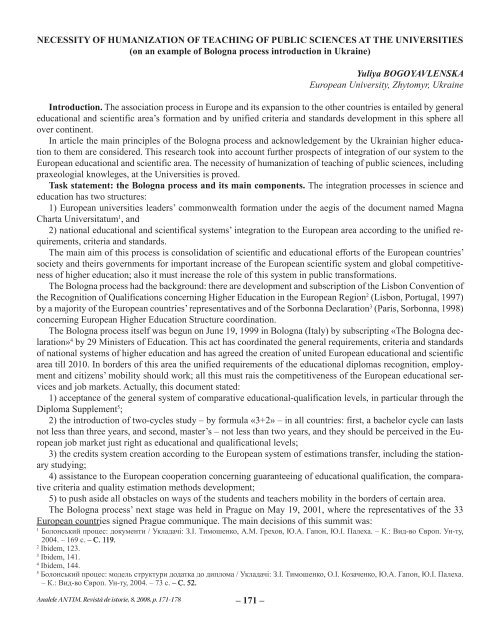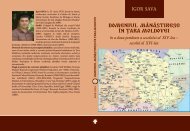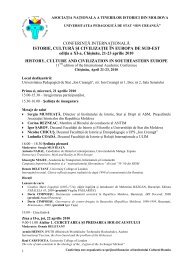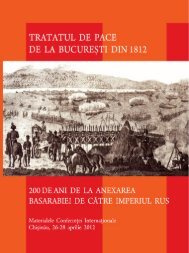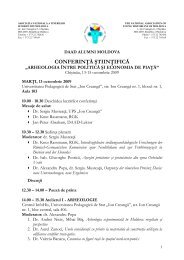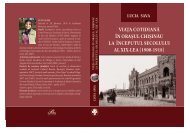Publicatie cu continut integral - Asociatia Tinerilor Istorici din Moldova
Publicatie cu continut integral - Asociatia Tinerilor Istorici din Moldova
Publicatie cu continut integral - Asociatia Tinerilor Istorici din Moldova
Create successful ePaper yourself
Turn your PDF publications into a flip-book with our unique Google optimized e-Paper software.
necessıtY oF HumanıZatıon oF teacHınG oF puBlıc scıences at tHe unıversıtıes<br />
(on an example of Bologna process introduction in ukraine)<br />
– 1 1 –<br />
Yuliya BOGOYaVlenSKa<br />
european University, zhytomyr, Ukraine<br />
ıntroduction. The association process in Europe and its expansion to the other countries is entailed by general<br />
educational and scientific area’s formation and by unified criteria and standards development in this sphere all<br />
over continent.<br />
In article the main principles of the Bologna process and acknowledgement by the Ukrainian higher education<br />
to them are considered. This research took into account further prospects of integration of our system to the<br />
European educational and scientific area. The necessity of humanization of teaching of public sciences, inclu<strong>din</strong>g<br />
praxeologial knowleges, at the Universities is proved.<br />
task statement: the Bologna process and its main components. The integration processes in science and<br />
education has two structures:<br />
1) European universities leaders’ commonwealth formation under the aegis of the do<strong>cu</strong>ment named Magna<br />
Charta Universitatum1 , and<br />
2) national educational and scientifical systems’ integration to the European area accor<strong>din</strong>g to the unified requirements,<br />
criteria and standards.<br />
The main aim of this process is consolidation of scientific and educational efforts of the European countries’<br />
society and theirs governments for important increase of the European scientific system and global competitiveness<br />
of higher education; also it must increase the role of this system in public transformations.<br />
The Bologna process had the background: there are development and subscription of the Lisbon Convention of<br />
the Recognition of Qualifications concerning Higher Education in the European Region2 (Lisbon, Portugal, 1997)<br />
by a majority of the European countries’ representatives and of the Sorbonna Declaration3 (Paris, Sorbonna, 1998)<br />
concerning European Higher Education Structure coor<strong>din</strong>ation.<br />
The Bologna process itself was begun on June 19, 1999 in Bologna (Italy) by subscripting «The Bologna declaration»<br />
4 by 29 Ministers of Education. This act has coor<strong>din</strong>ated the general requirements, criteria and standards<br />
of national systems of higher education and has agreed the creation of united European educational and scientific<br />
area till 2010. In borders of this area the unified requirements of the educational diplomas recognition, employment<br />
and citizens’ mobility should work; all this must rais the competitiveness of the European educational services<br />
and job markets. Actually, this do<strong>cu</strong>ment stated:<br />
1) acceptance of the general system of comparative educational-qualification levels, in parti<strong>cu</strong>lar through the<br />
Diploma Supplement5 ;<br />
2) the introduction of two-cycles study – by formula «3+2» – in all countries: first, a bachelor cycle can lasts<br />
not less than three years, and second, master’s – not less than two years, and they should be perceived in the European<br />
job market just right as educational and qualificational levels;<br />
3) the credits system creation accor<strong>din</strong>g to the European system of estimations transfer, inclu<strong>din</strong>g the stationary<br />
studying;<br />
4) assistance to the European cooperation concerning guaranteeing of educational qualification, the comparative<br />
criteria and quality estimation methods development;<br />
5) to push aside all obstacles on ways of the students and teachers mobility in the borders of certain area.<br />
The Bologna process’ next stage was held in Prague on May 19, 2001, where the representatives of the 33<br />
European countries signed Prague communique. The main decisions of this summit was:<br />
1 Болонський процес: документи / Укладачі: З.І. Тимошенко, А.М. Грехов, Ю.А. Гапон, Ю.І. Палеха. – К.: Вид-во Європ. Ун-ту,<br />
2004. – 169 с. – C. 119.<br />
2 Ibidem, 123.<br />
3 Ibidem, 141.<br />
4 Ibidem, 144.<br />
5 Болонський процес: модель структури додатка до диплома / Укладачі: З.І. Тимошенко, О.І. Козаченко, Ю.А. Гапон, Ю.І. Палеха.<br />
– К.: Вид-во Європ. Ун-ту, 2004. – 73 с. – C. 52.<br />
Analele ANTIM. Revistă de istorie, 8, 2008, p. 171-178


